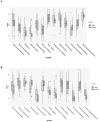Moral decision-making is altered in patients with schizophrenia
- PMID: 40315191
- PMCID: PMC12047836
- DOI: 10.1371/journal.pone.0322614
Moral decision-making is altered in patients with schizophrenia
Abstract
Introduction: Previous research suggests patients with schizophrenia have altered decision-making when presented with philosophical moral scenarios. However, not much is known about everyday moral decision-making in patients, which can be more relevant to their real-life social functioning.
Methods: 32 patients with schizophrenia and 32 control subjects were investigated using everyday moral vignettes. The vignettes consisted of two moral and immoral categories. Participants were asked to rate each vignette in dimensions such as emotional intensity, emotional aversion, harm, self-benefit, other-benefit, pre-mediation, legality, social norm violation, and moral appropriateness.
Results: Patients with schizophrenia evaluated immoral vignettes as less morally inappropriate compared to control subjects (F(1,62) = 15.5, p = 0.0002). Evaluation of benefit was also different between patients and control subjects, with patients evaluating self-benefit to be higher in moral vignettes (F(1,62) = 9.167, p = 0.004), and other-benefit to be higher in immoral vignettes (F(1,62) = 9.7, p = 0.003). No significant difference was observed in the assessment of emotional intensity and the remaining dimensions.
Conclusion: Most aspects of everyday moral decision-making remain intact in patients with schizophrenia. The observed deficits appear to be limited to the evaluation of moral appropriateness in immoral situations and overall benefit assessment. The distortion in benefit assessment for oneself and others could be a crucial area for targeted intervention in patients with schizophrenia.
Copyright: © 2025 Ahmadzadeh et al. This is an open access article distributed under the terms of the Creative Commons Attribution License, which permits unrestricted use, distribution, and reproduction in any medium, provided the original author and source are credited.
Conflict of interest statement
The authors have declared that no competing interests exist.
Figures
References
MeSH terms
LinkOut - more resources
Full Text Sources
Medical


